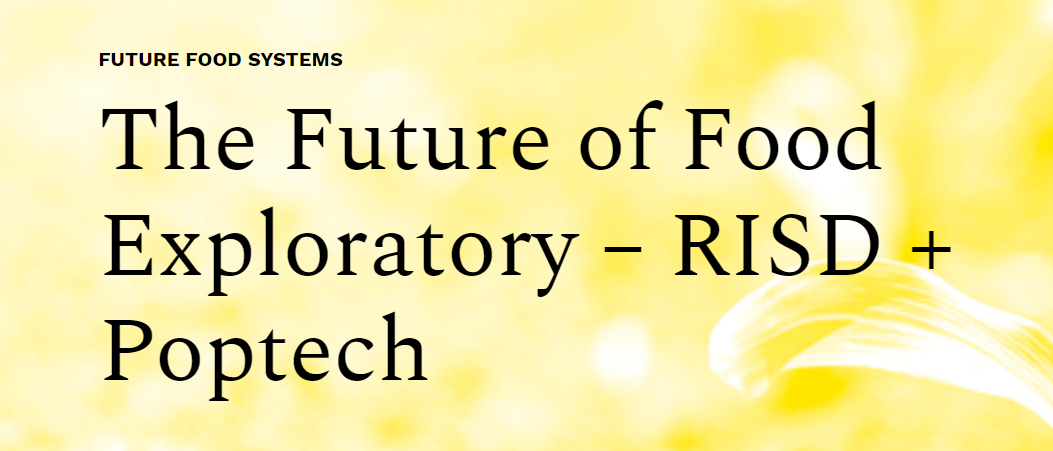Can the planet support the nutritional needs of growing global population, and at what cost?
In collaboration with PopTech, the Center for Complexity (CfC) hosted a two day convening in March 2019 to discuss the future of food. The global food system is among modern society’s most nonlinear and complex systems. Its emergent qualities arise from many sources including fashion, public health policy, climate change, logistics, cultural shifts, demographics and commerce to name a few. For most of us, the system is opaque; the simple act of ordering a hamburger belies the vast and complex supply chain that made it possible to sell the product for $2 or less. Even “farm to table” food systems, while ostensibly simple, rely on technologies and infrastructures unimaginable a century ago let alone at agriculture’s origins.
Today, humanity faces unresolved questions about how we will feed 3 billion more people in the next few decades. And at what cost to the planet, social and economic systems will that obligation come? There can be no single answer given the diversity of individual, family, community, municipal and national expectations and preferences of nutrition and food security. The outcome of this important question will be realized differently according to a wide spectrum of differing contexts and conditions. To describe the future of food is to describe the future of humanity.
A more manageable question about the future of food would have its locus in the instruments of food production, drawn broadly as farming. Farming is perhaps humanity’s most important and ancient technology to be realized at scale. Yet, modern farming continues to resemble its distant origins in many parts of the world. But, farming is undergoing a radical technological transformation; perhaps its most significant since the Agricultural Revolution 10,000 years ago.
The Agricultural Revolution is popularly understood to be humankind’s first entry onto the global stage; its most important step to becoming the dominant species on the planet. The Agricultural Revolution fits nicely into our narratives of human progress and innovation that shape how we understand ourselves and how we view technology. But, as with many things, this narrative is problematic. As Yuval Harari writes in Sapiens:
"Foragers knew the secrets of nature long before the Agricultural Revolution, since their survival depended on an intimate knowledge of the animals they hunted and the plants they gathered. Rather than heralding a new era of easy living, the Agricultural Revolution left farmers with lives generally more difficult and less satisfying than those of foragers. Hunter-gatherers spent their time in more stimulating and varied ways, and were less in danger of starvation and disease. The Agricultural Revolution certainly enlarged the sum total of food at the disposal of humankind, but the extra food did not translate into a better diet or more leisure. Rather, it translated into population explosions and pampered elites. The average farmer worked harder than the average forager, and got a worse diet in return. The Agricultural Revolution was history’s biggest fraud." (p. 79)
Before we embark on another Agricultural Revolution, it is important that we understand, not just how this will unfold, but why it will benefit humanity. We must attempt to forecast what the outcome will be. The first Revolution profoundly reshaped our societies, communities, families, diets, governance systems, conceptions of nature and time. Will the next Agricultural Revolution do the same? And if so, to what end?
This first convening on the Future of Food Exploratory explored these questions with 30 leading thinkers and practitioners active in this second revolution with an aim of seeding the ground for future projects and research on the topic.
-

In the Round: The Future of Food
Teddy Bekele, Jane Black, Mitchell Davis, Jon de la Para Harper, Natalie DiNicola, Virginia Dunleavy, Sam Fiorello, Kimberly Flowers, Raj Gollamudi, Daniel Hewett, Jak Knowles, Tom Laurita, Robert Lawrence, Maureen Mazurek, Robyn Metcalfe, Mike Miille, Hari Pulapaka, Jenneffer Pulapaka, Patricia Risica, Simone Sala, Chase Sova, Karen Washingon, Tom Weis, and Center for Complexity
In collaboration with PopTech, the Center for Complexity (CfC) hosted a two day convening in March 2019 to discuss the future of food, conducted in-the-round. Conversations-in-the-round offer an experimental and collaborative forum where a variety of perspectives collide to reimagine how we should approach navigating complex challenges.
30 professionals, community leaders, ag-tech startups, policymakers, local activists, global aid administrators, and many other important voices in the food industry were in attendance. We did not set out to create solutions, rather we devoted our time to exploration — a process that allowed us to assess, discover, reality-check, and strategically plan the next phase of the journey. A publication was created to capture the discussions, workshops, proposals, deign principles and actionable next steps.
The outcomes of this first convening will guide what comes next. Our aim is to initiate a series of projects conducted by the CfC and our partners to advance the future of food according to shared design principles. We are working with PopTech to host further convenings.
-

RISD + PopTech Future of Food Exploratory
PopTech and Center for Complexity
Like most things PopTech, the notion of exploring the future of food started with a conversation among a few PopTech community members over a shared meal in Maine.
That was in 2017!
Over the ensuing months, we expanded our circle to include talented individuals and organizations committed to defining what it means to create an equitable global food system.
While our early efforts may only be a ripple in what we hope will be a sea change, it is worth noting that most meaningful endeavors start with the commitment of a few.
We did not set out to create solutions, rather we devoted our time to exploration. We surfaced more questions than answers. We respectfully agreed to disagree.
We wish to express our thanks to our colleagues, partners, and co-hosts at the Center for Complexity, as well as the Industrial Design Department at the Rhode Island School of Design.

